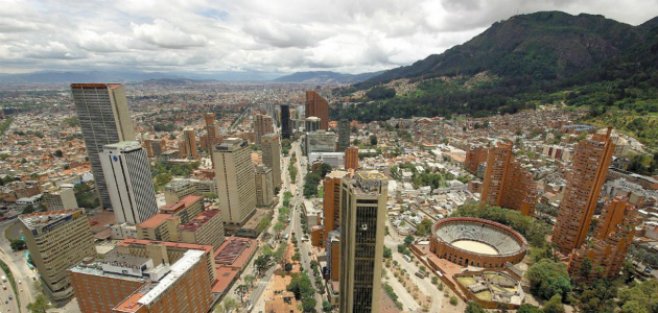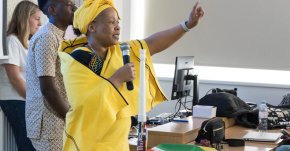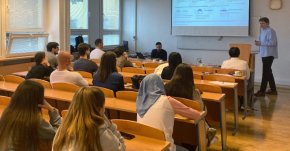
Colombia, the only risk is wanting to stay
17. 2. 2014 14:06 Author: Sandra Gottfriedová Selling Colombia as a tourist destination has been a difficult task in the past. For many foreigners, images of drug violence eclipsed Colombia of Shakira, Juan Valdez, Fernando Botero or Gabriel García Márquez. Not even the lure of pristine Caribbean waters, ecological tourism in Amazon jungle or archaeological site of an ancient “Lost City” that it is believed to have been founded about 700 years earlier than Machu Picchu, was enough to help boost tourism to desired levels.
I had the opportunity to study two semesters at Universidad del Rosario in Bogotá this year. Universidad del Rosario is a prestigious Colombian university founded 360 years ago and it has played an important role in Colombian history. As a curious fact, at least 28 of Colombia's presidents have been students of this University and it has participated in very important processes like the revolution for the independence from Spain or the drafting of the National Constitution. Moreover, one of the most important Constitution's Supreme Court, the so-called golden court, was composed in its majority by lawyers from the Faculty of Jurisprudence of Universidad del Rosario. 
Metropolitní Univerzita Praha has an international cooperation program that gave me the opportunity to study in Colombia. Despite the fact that Colombia is mostly known to be country that has suffered decades of civil conflict my own experience was peaceful and very enriching. I have sensed a gradual evolution in terms of infrastructure, security, education and tourism. However, the main reason I, and so many people love Colombia is thanks to the warm hearted and cheerful people who made my experience in Colombia unforgettable.
Universidad del Rosario is situated in the historical center of Bogotá which is always crowded, full of students and people selling everything you can imagine. The center offers an opportunity to buy all kinds of exotic fruits or a precious emerald stone on the street. You can bet on a guinea-pig race or just observe the buzz of the city. During my stay, there were massive protests every week which were always held in the city center just next to the University. Sometimes, we weren’t able to hear the professor as the enthusiastic Colombians were striking for effective peace talks, woman’s rights or just for more effective waste management. It was interesting to see people’s efforts to make a change or at least to highlight problems that are bothering them. Passers-by can throw a tomato at pictures of politicians or they can learn to dance salsa on the street; the center of Bogotá is very alive and full of fun. In a case you want to avoid the city rush you can escape by local bus called Transmilenio and experience much calmer atmosphere in the north of the city. The north has large green parks, gardens, red-brick houses and modern shopping malls but you will miss the typical colorful Colombian life which is seen in the center of Bogotá. It is easy to go out of the city and enjoy the tropical climate; only an hour drive to most popular places like Melgár or Girardot. 
San Andrés and Providencia Island is a beautiful place for holiday with its unique Caribbean sea of 7 colors. I visited the archipelago during my holidays. I began a research about an Anglophone community – Raizales there. I interviewed several members of this community and visited town office statistics department and local libraries in order to write my Diploma Thesis on the issues these unknown communities have to face. Despite the fact that Raizales on San Andrés and Providencia Island belong to Colombia, they speak English and they are excluded from the public life. Unfortunately, they often face discrimination and they are a minority in their own territory.
All in all, it was a great year of my life. There is no need to be afraid of studying in Colombia as I already mentioned above, the only risk is wanting to stay.
Other items from the/this section
 Populism, Foreign Policy, and a Week of Intense Debate: PhD Summer School at MUP
9. 6. 2025 Author: Šárka Kolmašová
From June 2 to 6, the Center for Security Studies (C4SS) at Metropolitan University Prague hosted a week-long Doctoral Summer School under the Erasmus+ Blended Intensive Programme (BIP), taking on one of today’s most urgent political questions: How is populism reshaping foreign and security policy in Central and Eastern Europe? The event gathered PhD students from Poland, Slovakia, Lithuania, Portugal, and Bulgaria, each bringing fresh insights and case studies from their own regions. Across five packed days—and two preparatory online sessions—participants dissected narratives, analyzed media, pitched research, and explored publishing strategies with a lineup of top-tier scholars.
Populism, Foreign Policy, and a Week of Intense Debate: PhD Summer School at MUP
9. 6. 2025 Author: Šárka Kolmašová
From June 2 to 6, the Center for Security Studies (C4SS) at Metropolitan University Prague hosted a week-long Doctoral Summer School under the Erasmus+ Blended Intensive Programme (BIP), taking on one of today’s most urgent political questions: How is populism reshaping foreign and security policy in Central and Eastern Europe? The event gathered PhD students from Poland, Slovakia, Lithuania, Portugal, and Bulgaria, each bringing fresh insights and case studies from their own regions. Across five packed days—and two preparatory online sessions—participants dissected narratives, analyzed media, pitched research, and explored publishing strategies with a lineup of top-tier scholars.
 South Africa and Beyond – An International Student Trade Fair at MUP
19. 5. 2025 Author: Tereza Němečková
On Tuesday, 13 May 2025, we had the honour of welcoming students from the Tshwane School for Business and Society, our partner university in South Africa, who participated in an international student trade fair organized by the African Studies Centre and the Department of International Business.
South Africa and Beyond – An International Student Trade Fair at MUP
19. 5. 2025 Author: Tereza Němečková
On Tuesday, 13 May 2025, we had the honour of welcoming students from the Tshwane School for Business and Society, our partner university in South Africa, who participated in an international student trade fair organized by the African Studies Centre and the Department of International Business.
 ESG and Sustainability in Practice: Guest Lecture by SAP Experts and Invitation to SAP Open Day
29. 4. 2025 Author: Irena Jindřichovská
On April 25, 2025, a guest lecture titled "ESG and Sustainability" was held at the Metropolitan University Prague, organized by the Department of Financial Management. The guest speakers were Çağdaş Özer, Lead ESG Reporting Technology Adoption & Integration, and Mykola Vlasov, Green Ledger and Carbon Accounting expert from SAP.
ESG and Sustainability in Practice: Guest Lecture by SAP Experts and Invitation to SAP Open Day
29. 4. 2025 Author: Irena Jindřichovská
On April 25, 2025, a guest lecture titled "ESG and Sustainability" was held at the Metropolitan University Prague, organized by the Department of Financial Management. The guest speakers were Çağdaş Özer, Lead ESG Reporting Technology Adoption & Integration, and Mykola Vlasov, Green Ledger and Carbon Accounting expert from SAP.